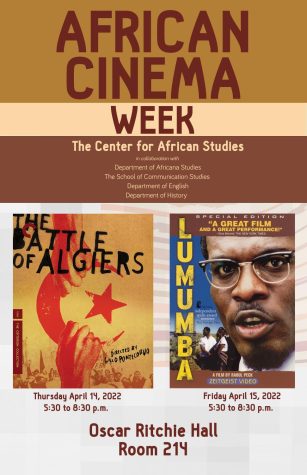African Cinema Week concludes with a showing “Lumumba”
“Lumumba” – a true film based on the rise to power and assassination of the former leader of the independent Congo, Patrice Lumumba, was shown during African Cinema Week on Friday.
“The theme of this event was independence and African independence figures,” said Ikram Toumi, an associate professor in the School of Communication Studies. “This is a great movie to represent the struggle for the independence of Congo and Lumumba, one of the greatest independence figures of an African country’s struggle for independence.”
The event was hosted by the Center for African Studies in collaboration with the School of Communication Studies, the Department of English and the Department of History. It gave students an opportunity to learn about African culture and its fight for independence during the post-colonial era.
“Movies and films can broaden the scope of the content that we study in class,” said Felix Kumah-Abiwu, associate professor of Pan-African studies. “It is a way to help our students have a better understanding of the struggles that many countries in Africa had to go through.”
The movie focused on Lumumba’s rise to power in 1960 when he became the first prime minister of the Democratic Republic of the Congo after transforming a small colony in Belgium into an independent republic.

Lumumba began in politics after working as a beer salesman in Congo. During his delivery routes, he held rallies with native citizens of Congo, demanding Belgium give the nation its independence. He spent time in jail for his activism.
Shortly after, Lumumba was summoned from prison and achieved independence for Congo. However, he did not agree with the political motives in Belgium and the United States at the time.
After rumors spread that Lumumba was a communist, his entire team was attacked. His leadership lasted less than four months before he was assassinated in September 1960.
Many countries in Africa were colonized for a long time. They struggled for their dignity and humanity to be free, Kumah-Abiwu said.
“Like many struggles, they felt they were prepared to die for the cause,” he said. “Freedom is not free. Their oppressors never just [gave them freedom], they had to fight for their freedom.”
African Cinema Week featured two movies, including a screening of “The Battle of Algiers,” which showcased the fight for independence during the Algerian revolution. The film is based on a true story during the Algerian War against the French government in North Africa from 1954 to 1962.
“These two films symbolize the struggles that Africa faced,” Kumah-Abiwu said. “Films and documentary films, or movies, bring history alive.”
In the future, the center plans to host events similar to this one, Toumi said.
“This is one of the reasons why we created this center,” she said, “so we can have events and offer our students an experience that complements what they learn in class.”
Joshua Bailey is a reporter. Contact him at [email protected].
Josh is a senior majoring in journalism with a minor in marketing. He previously served as the TV2's Executive Producer. This is his final semester with...


